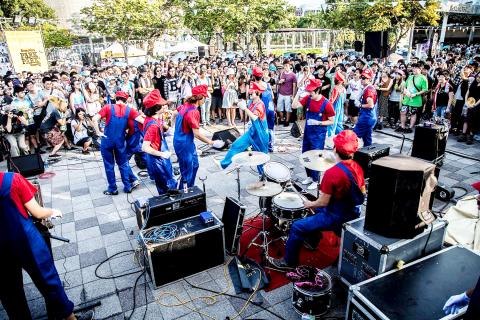No, that’s not a cutesy reduplication in the name of this weekend’s StreetVoice Park Park Carnival. It literally refers to the act of parking a car in a public park.
Set for Saturday and Sunday, the carnival is held throughout Taipei Flora Expo Park (台北花博公園) with 11 live band areas, two DJ booths, a debate forum and a creative market. The bands will be playing in front of cars they are in charge of decorating and arranging into a performance area, hence the event’s name. That’s not all with the versatile word, though, with each area named after a parking lot in Taipei.
StreetVoice, a Chinese-language online music community Web site started the carnival with the goal of creating a free, diverse and intimate music festival without stages where the audience is encouraged to interact with the performers, says carnival spokesperson Lu Chun-ping (陸君萍).

Photo courtesy of StreetVoice Park Park Carnival
“When audience and performer are back to an eye-to-eye level, would it spark a new kind of relationship? Would it make live concerts more palatable to people who usually don’t attend them?” Lu asks.
Lu said she was happy last year to see listeners dancing alongside the musicians as well as elderly people checking out the events with their grandchildren.
“Isn’t this the musical scene we’ve all dreamed about?” she asks.
THE MUSIC
Groups consisting of three bands apply to participate through the Web site and are given a basic theme by organizers for their car decorations. More than 120 mostly local musical acts are on the bill, ranging from folk to death metal.
“The main point of this event isn’t whether the music is good or not,” Lu says. “It allows these musicians to display their crazy ideas and thoughts — which represent their personalities and aesthetic tastes — so they are seen as real human beings instead of just vehicles for music.”
Organizers have reserved one of the band areas for invited local and international acts such as Japan’s Mowmowlulugyaban and Chinese punk trio Reflector (反光鏡樂團).
One of the DJ stages is manned by Super ADD, known for their parties that combine electronic music and installation art, while the other features amateurs, also by application, who are limited to spinning Chinese — Mandarin, Cantonese, Hakka, Hoklo and so on — and Aboriginal-language pop tracks.
The market consists of mostly handmade clothes and crafts, and attendees can grab food and drinks from Maji Maji Square (MAJI MAJI集食行樂) located in the park. Organizers have also reserved one of the band areas as a semi-truck stage for invited local and international acts.
Lu says this feature has drawn criticism for going against the free-for-all spirit of the festival, but they also hope to promote international music exchanges and collaborations in Asia.
There’s no limit to what the performers can do — Lu says they can project a movie onto their car or play hide-and-seek with the audience, who can even provide beer to the musicians in exchange for merchandise.
“We don’t want performers and audience to attend this festival from a traditional point of view and end up limiting themselves,” Lu says. “It’s an event that hopes to smash the authoritative division between those onstage and offstage.”

In the March 9 edition of the Taipei Times a piece by Ninon Godefroy ran with the headine “The quiet, gentle rhythm of Taiwan.” It started with the line “Taiwan is a small, humble place. There is no Eiffel Tower, no pyramids — no singular attraction that draws the world’s attention.” I laughed out loud at that. This was out of no disrespect for the author or the piece, which made some interesting analogies and good points about how both Din Tai Fung’s and Taiwan Semiconductor Manufacturing Co’s (TSMC, 台積電) meticulous attention to detail and quality are not quite up to

April 21 to April 27 Hsieh Er’s (謝娥) political fortunes were rising fast after she got out of jail and joined the Chinese Nationalist Party (KMT) in December 1945. Not only did she hold key positions in various committees, she was elected the only woman on the Taipei City Council and headed to Nanjing in 1946 as the sole Taiwanese female representative to the National Constituent Assembly. With the support of first lady Soong May-ling (宋美齡), she started the Taipei Women’s Association and Taiwan Provincial Women’s Association, where she

Chinese Nationalist Party (KMT) Chairman Eric Chu (朱立倫) hatched a bold plan to charge forward and seize the initiative when he held a protest in front of the Taipei City Prosecutors’ Office. Though risky, because illegal, its success would help tackle at least six problems facing both himself and the KMT. What he did not see coming was Taipei Mayor Chiang Wan-an (將萬安) tripping him up out of the gate. In spite of Chu being the most consequential and successful KMT chairman since the early 2010s — arguably saving the party from financial ruin and restoring its electoral viability —

It is one of the more remarkable facts of Taiwan history that it was never occupied or claimed by any of the numerous kingdoms of southern China — Han or otherwise — that lay just across the water from it. None of their brilliant ministers ever discovered that Taiwan was a “core interest” of the state whose annexation was “inevitable.” As Paul Kua notes in an excellent monograph laying out how the Portuguese gave Taiwan the name “Formosa,” the first Europeans to express an interest in occupying Taiwan were the Spanish. Tonio Andrade in his seminal work, How Taiwan Became Chinese,